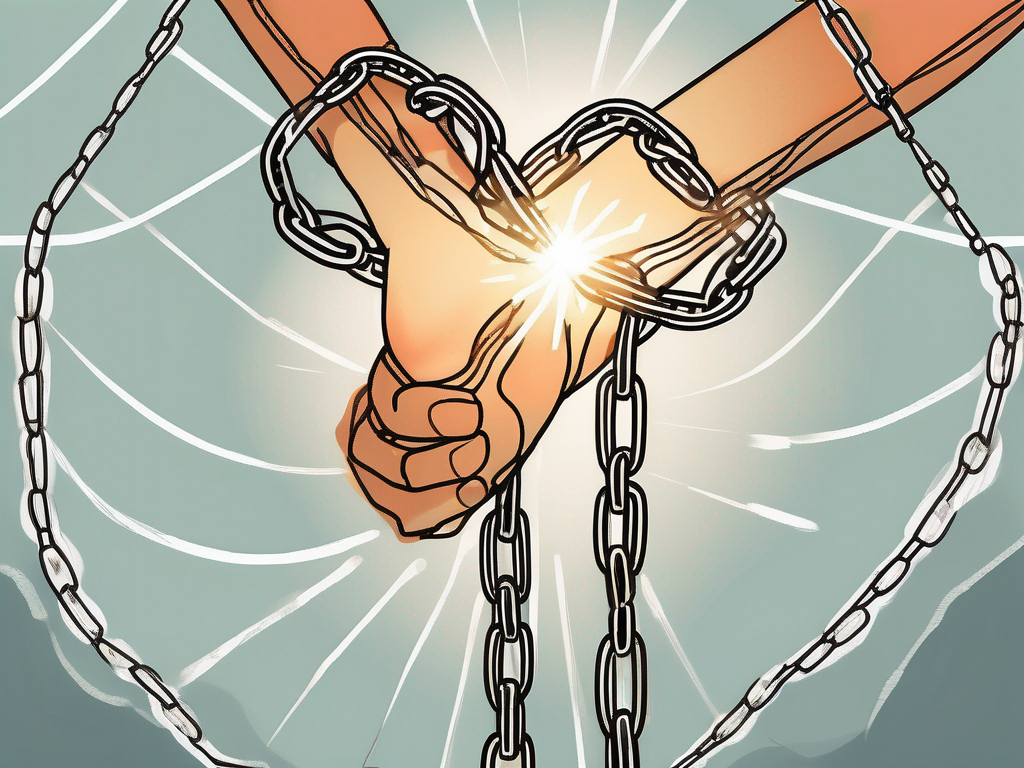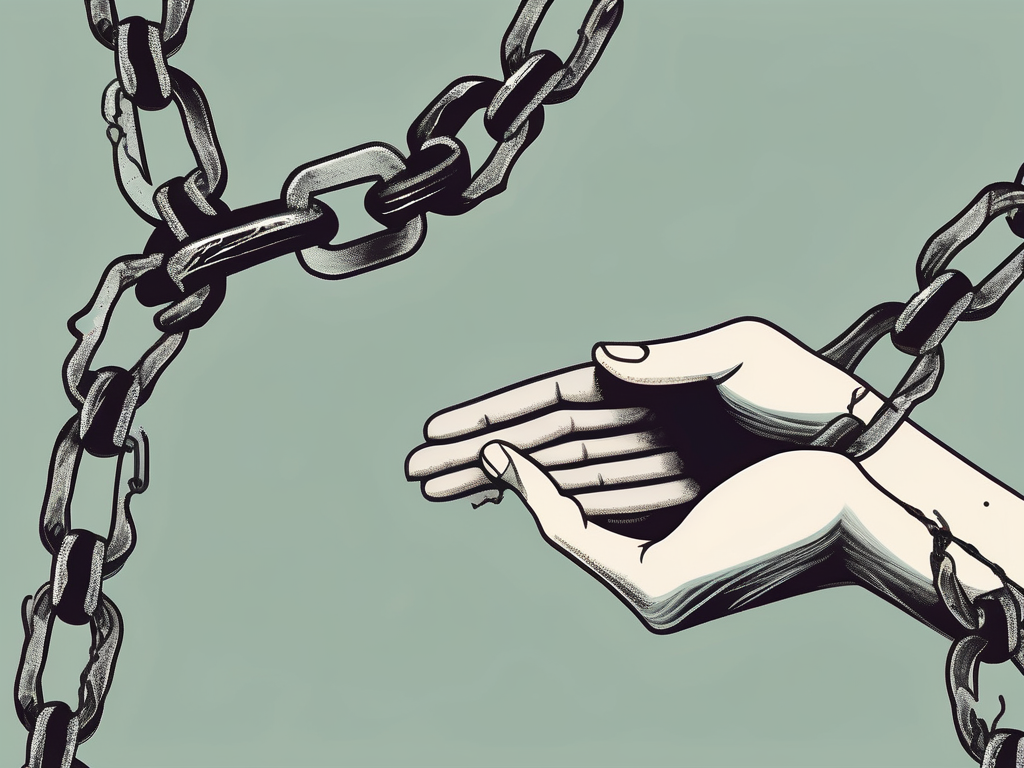Betrayal is a topic of great significance in the Bible. Throughout the scriptures, numerous stories and teachings shed light on the concept of betrayal and its implications. In this article, we will explore what the Bible has to say about betrayal, including its definition, moral implications, consequences, seeking forgiveness and redemption, and the lessons it holds for us in modern life.
Understanding the Concept of Betrayal in Biblical Context
Before delving into the biblical stories and teachings, let’s first understand what betrayal means from a biblical perspective. Betrayal is more than just a breach of trust; it is a profound violation of the bond between individuals or communities. In the Bible, betrayal can take many forms, including deception, infidelity, disloyalty, and denial.
Defining Betrayal from a Biblical Perspective
From a biblical perspective, betrayal encompasses actions that go against moral principles and the commandments of God. It involves turning away from the path of righteousness, damaging relationships, and causing harm to oneself and others. The Bible explicitly condemns betrayal and highlights its devastating consequences.
One example of betrayal in the Bible is the story of Judas Iscariot, who betrayed Jesus with a kiss. Judas, one of Jesus’ disciples, made a pact with the religious leaders to hand Jesus over to them in exchange for thirty pieces of silver. This act of betrayal not only led to Jesus’ crucifixion but also tarnished Judas’ reputation for eternity. The story serves as a cautionary tale, illustrating the severe consequences of betrayal.
Another example of betrayal is found in the story of King David and his trusted advisor, Uriah the Hittite. David, overcome by desire for Uriah’s wife, Bathsheba, orchestrated a plan to have Uriah killed in battle. This act of betrayal not only violated the sanctity of marriage but also resulted in the loss of an innocent life. The story highlights the destructive power of betrayal and the devastating consequences it can have on individuals and communities.
The Moral Implications of Betrayal
Betrayal raises important ethical questions. When someone betrays another, they not only break a promise or commitment but also harm the moral fabric of society. Betrayal severs the bonds of trust and integrity, leading to a breakdown in relationships and undermining the values that hold communities together. Thus, the Bible emphasizes the importance of loyalty, honesty, and righteousness in interpersonal and societal contexts.
Furthermore, the Bible provides guidance on how to deal with betrayal. It encourages forgiveness and reconciliation, emphasizing the transformative power of love and compassion. Jesus, in his teachings, urged his followers to love their enemies and pray for those who persecute them. This radical approach challenges the natural inclination to seek revenge and instead promotes healing and restoration.
It is important to note that betrayal is not limited to biblical times but continues to be a prevalent issue in today’s society. The consequences of betrayal can be seen in broken families, shattered friendships, and even political scandals. Understanding the biblical perspective on betrayal can provide valuable insights into the moral implications of our actions and guide us towards building a more trustworthy and compassionate world.
Biblical Stories Highlighting Betrayal
To gain deeper insights into the concept of betrayal, we can turn to the Bible’s rich collection of stories. These narratives serve as cautionary tales, showcasing the consequences and impact of betrayal on individuals and communities.
Betrayal is a theme that runs deep in the Old Testament, with several stories highlighting the devastating effects of treachery. One of the most prominent instances of betrayal is the story of Joseph and his brothers. Out of envy, Joseph’s brothers betray him by selling him into slavery. This act not only fractures their family but also sets in motion a series of events that ultimately leads to Joseph’s rise to power in Egypt. The story of Joseph serves as a powerful reminder of how betrayal can shape the course of one’s life, both for the betrayer and the betrayed.
Another instance of betrayal in the Old Testament is the story of Samson and Delilah. Delilah, driven by greed and a desire for personal gain, betrays Samson by revealing the secret of his strength to the Philistines. This act of treachery leaves Samson vulnerable and leads to his capture and imprisonment. Through this story, we learn about the dangers of misplaced trust and the devastating consequences that can arise from betrayal.
Turning to the New Testament, we encounter the most well-known example of betrayal – the story of Judas Iscariot. Judas, one of Jesus’ disciples, betrays him for thirty pieces of silver. This act of betrayal leads to Jesus’ arrest, trial, and crucifixion. The story of Judas serves as a reminder of the profound consequences that betrayal can have, even on the life of the Son of God. It raises questions about loyalty, trust, and the complexities of human nature.
These biblical stories of betrayal offer valuable insights into the human condition and the moral dilemmas we face. They remind us of the importance of trust, loyalty, and integrity in our relationships. Through these cautionary tales, we are encouraged to reflect on our own actions and consider the potential consequences of betrayal in our own lives.
The Consequences of Betrayal According to the Bible
Betrayal carries severe consequences, both spiritually and socially. Understanding these consequences can help us appreciate the gravity of betrayal and its impact on individuals and communities.
Betrayal, as depicted in the Bible, is a profound act that has far-reaching implications. It is not merely a breach of trust, but a rupture in the very fabric of relationships. The consequences of betrayal, both spiritual and social, are deeply intertwined, reflecting the intricate nature of human connections.
Spiritual Consequences of Betrayal
From a spiritual perspective, betrayal distances individuals from God. It damages the relationship between God and the person committing the betrayal, as well as between God and the one who experiences it. The Bible warns against the spiritual consequences of betrayal and encourages individuals to seek forgiveness and redemption.
When someone betrays another, they not only sever the trust between themselves and the person they betray, but they also create a chasm between themselves and God. The act of betrayal is seen as a violation of the sacred bond between God and humanity, tarnishing the soul of the betrayer. It is a betrayal of divine trust, leading to a sense of spiritual estrangement.
Furthermore, the consequences of betrayal extend beyond the individual involved. The ripple effect of betrayal can be felt in the broader spiritual community, as it erodes the foundation of trust and unity among believers. It disrupts the harmony of the congregation, causing divisions and sowing seeds of doubt and suspicion.
Social Consequences of Betrayal
Socially, betrayal disrupts the harmony and trust within communities. It breeds resentment, division, and hostility, leading to a breakdown of relationships. The consequences of betrayal can extend far beyond the individuals directly involved, affecting families, friendships, and even entire societies. Recognizing these social consequences calls for a collective effort to prevent and address instances of betrayal.
When betrayal occurs within a social context, it fractures the bonds that hold individuals together. Trust, the cornerstone of any healthy relationship, is shattered, leaving behind a trail of brokenness and pain. The consequences of betrayal ripple through families, causing rifts between spouses, parents and children, and siblings. Friendships, once built on a foundation of trust, crumble under the weight of betrayal.
Moreover, betrayal can have a profound impact on society as a whole. In history, we can find numerous examples of betrayals that have led to political upheaval, social unrest, and even wars. The betrayal of a leader or a trusted figure can shake the very foundations of a nation, leaving its citizens disillusioned and divided.
Recognizing the social consequences of betrayal compels us to actively work towards fostering an environment of trust and loyalty. It calls for a commitment to open communication, empathy, and accountability. By addressing instances of betrayal head-on and seeking reconciliation, we can begin to rebuild the broken relationships and heal the wounds inflicted by betrayal.
Seeking Forgiveness and Redemption After Betrayal
Despite the devastating effects of betrayal, the Bible offers hope for those who have experienced or committed betrayal. It teaches us about the power of repentance, forgiveness, and redemption.
When we find ourselves in the depths of betrayal, it can feel like there is no way out. The pain and hurt can be overwhelming, leaving us feeling lost and broken. However, the Bible reminds us that there is always a path to healing and restoration.
The Process of Repentance
Repentance is a crucial step towards healing and reconciliation. It involves acknowledging the betrayal, feeling genuine remorse, and making a conscious decision to turn away from that behavior. The Bible stresses the importance of sincere repentance and encourages individuals to seek forgiveness from God and those they have betrayed.
Repentance is not just about saying sorry; it is about a complete change of heart and mind. It requires us to confront our actions and the pain we have caused others. It is a humbling process that requires us to take responsibility for our choices and their consequences.
Through repentance, we can begin to rebuild trust and repair the damage that has been done. It is a journey that takes time and effort, but it is worth it for the sake of our own growth and the restoration of relationships.
The Power of Forgiveness in Healing Betrayal
Forgiveness is a central theme in the Bible, offering a path towards healing and restoration. Jesus exemplifies forgiveness, even in the face of profound betrayal. Just as God forgives us, the Bible teaches us to forgive those who have betrayed us. Forgiveness releases us from the burden of anger and resentment, allowing us to experience true healing and transformation.
Forgiveness is not easy, especially when the pain runs deep. It requires us to let go of our desire for revenge and instead choose love and compassion. It is a decision to release the person who has hurt us from the debt they owe us, freeing ourselves from the chains of bitterness.
Forgiveness does not mean forgetting or condoning the betrayal. It is about finding a way to move forward, to let go of the past and create a new future. It is a process that involves setting boundaries, rebuilding trust, and learning to love again.
When we choose to forgive, we open ourselves up to the possibility of redemption. We give ourselves and others the opportunity to grow, to learn from our mistakes, and to become better versions of ourselves.
Seeking forgiveness and redemption after betrayal is a challenging and transformative journey. It requires strength, humility, and a willingness to confront our own shortcomings. But through repentance and forgiveness, we can find healing, restoration, and a renewed sense of hope.
Applying Biblical Teachings on Betrayal in Modern Life
The lessons on betrayal from the Bible are timeless and relevant, offering guidance for navigating personal relationships and societal challenges. Betrayal, a deeply painful experience, has been a part of human existence since ancient times. The Bible, with its rich narratives and teachings, provides us with valuable insights on how to understand and respond to betrayal in our lives.
Lessons on Betrayal for Personal Relationships
In personal relationships, the Bible teaches us to prioritize trust, loyalty, and honesty. It encourages us to foster healthy communication and genuine empathy, creating a foundation of strong bonds that are resilient to betrayal. One of the most well-known stories of betrayal in the Bible is the story of Judas Iscariot, who betrayed Jesus for thirty pieces of silver. This narrative serves as a cautionary tale, reminding us of the devastating consequences of betrayal and the importance of cultivating trust in our relationships.
Furthermore, the Bible reminds us of our own capacity to betray others and calls us to examine our actions and intentions in all relationships. It urges us to practice self-reflection and humility, recognizing that we too are capable of hurting those we care about. By acknowledging our own vulnerabilities and striving for personal growth, we can become more compassionate and understanding individuals, fostering healthier and more fulfilling relationships.
Lessons on Betrayal for Community and Society
On a broader scale, the Bible’s teachings on betrayal promote social responsibility and justice. It urges us to address the systemic issues that contribute to betrayals within communities and work towards creating inclusive, compassionate societies. The story of Joseph in the book of Genesis exemplifies this, as Joseph’s brothers betray him out of jealousy and he eventually forgives them, leading to reconciliation and the preservation of their community.
By embodying the principles of love, forgiveness, and reconciliation, we can build communities that stand united against betrayal and its harmful consequences. The Bible calls us to actively seek justice and advocate for the marginalized, addressing the root causes of betrayal and working towards a more equitable society. It reminds us that betrayal is not just an individual act, but a reflection of the larger societal structures that perpetuate injustice.
In conclusion, the Bible provides profound insights into the concept of betrayal. It defines betrayal, highlights its moral implications, showcases its consequences through biblical stories, and offers a path towards forgiveness and redemption. By applying these teachings in our lives, we can strive for healthier relationships, stronger communities, and a world that rejects betrayal in all its forms. Let us embrace the wisdom of the Bible and navigate the complexities of betrayal with grace, compassion, and a commitment to justice.












